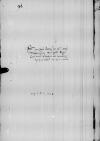List #1981
Ioannes DANTISCUS do Tiedemann GIESEHeilsberg (Lidzbark Warmiński), 1538-11-11
Regest polski:
Dantyszek dziękuje za przesłane koźlęta (capreoli). Bardzo uradowałaby go osobista obecność Giesego na zaślubinach siostry [Katarzyny von Höfen], przyjmuje jednak usprawiedliwienie i dziękuje za nowiny.
Zawiadamia Giesego o przybyciu posłańca dziekana krakowskiego [Samuela] Maciejowskiego. Przyniósł on wiadomość o dobrym zdrowiu króla [Zygmunta I]. Pisano także Dantyszkowi o osaczeniu floty tureckiej przez połączone floty papieża [Pawła III], cesarza [Karola V Habsburga], Wenecji i [Genui] pod dowództwem Andrei Dorii. W Italii odbywają się nabożeństwa błagalne w intencji zwycięstwa.
Niebawem, gdy tylko powróci z Krakowa jego własny posłaniec, Dantyszek odeśle z powrotem posłańca Maciejowskiego. Giese może przekazać przez niego swoją korespondencję. Zdaniem Dantyszka sprawy opisane w liście kasztelana [Achacego Cemy] zostały już ułożone według rady Giesego. Posłaniec Dantyszka zapewne przywiezie stosowny list królewski.
Dokładną kopię przysięgi, którą składał Dantyszek, znajdzie Giese we własnej bulli. Na wszelki wypadek jednak Dantyszek zasięgnie jeszcze rady w tej sprawie u pewnych biskupów z Królestwa.
| odebrano 1538-11-13 Rękopiśmienne podstawy źródłowe:
Publikacje:
| ||||||
Tekst + aparat krytyczny + komentarzZwykły tekstTekst + komentarzTekst + aparat krytyczny
Reverendissimo in Christo Patri et Domino, domino
Reverendissime in Christo Pater et Domine, amice carissime et honorande.
Salutem et solitam amoris commendationem.
Pro capreolis missis multam habeo gratiam. Gratum mihi fuisset plurimum, si commode
Pro novis gratias ago. 1538-11-10⌊Heri1538-11-10⌋ missus ad me a domino decano Cracoviensi
Exemplum iuramenti, quod ego praestiti, Dominatio Vestra Reverendissima in sua habet bulla – contuli enim – convenit in omnibus. Scripturus tamen sum in omnem eventum quibusdam nostris in
Dominationem Vestram Reverendissimam diutissime felicissimeque valere cupio ex animo.
Ex
Reverendissimae Dominationis Vestrae deditissimus frater
[1] Actually, the Ottoman fleet commanded by
[2] Letter from


 BCz, 245, p. 98
BCz, 245, p. 98